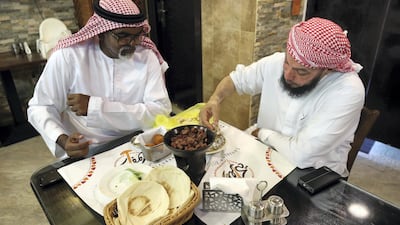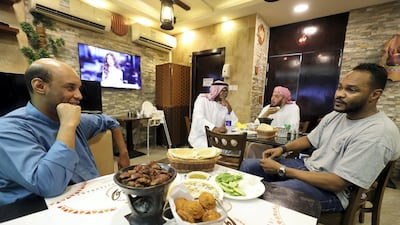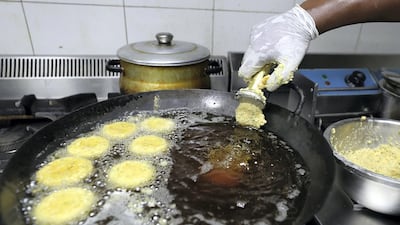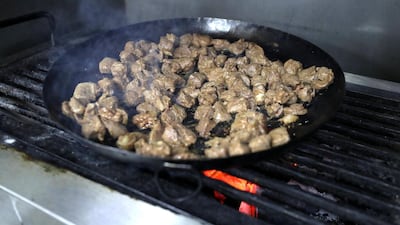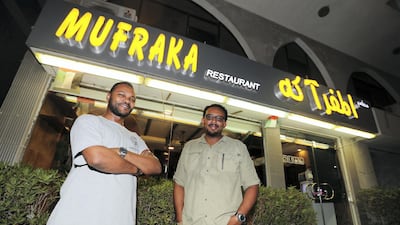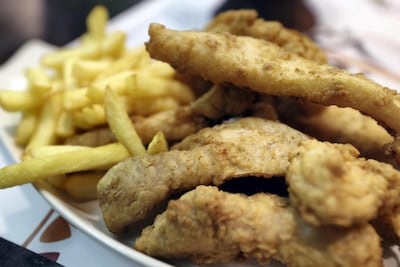Here is a tip: when you are dealing with Sudanese people, you have to understand that time is a relative concept. That might sound like a insulting generalisation, but this is what Mujahed Salah, the proud co-owner of Sudanese restaurant Al Mufraka, tells me when I visit his eatery.
It is one of those painfully humid nights in Abu Dhabi. Fortunately, we are ensconced within the cool and cosy confines of the 20-seater restaurant, digging into a lavish feast of North African grub.
Located in the old district of Tanker Mai, recently opened Al Mufraka is one of only a handful of Sudanese restaurants in Abu Dhabi. I decided to find out what all the online fuss was about and, in the process, I ended up learning more about the culture of this proud African nation.
Read More from Saeed
Complaining about summer in the UAE? Check your privilege
Zero to tarteeb: 5 terms to know before visiting a UAE barber or 'saloon'
The story behind the gloves some Abu Dhabi taxi drivers wear
“We don’t do schedules,” Salah says, qualifying his earlier statement as we dig into the introductory plate of Sudanese falafel – a fluffier proposition than the Egyptian variety due to it being made from chickpeas rather than fava beans. “We normally come half an hour late or so to anything. Like tonight, you said 8pm and I come 8.30. This is how it is. Unless it is my morning job, I don’t come early or on time. It will feel weird for me to do so. That’s the African side in us – we take our time.”
While chatting to Salah, I discover there are many different "sides" to Sudanese culture, and they are subtly apparent in the food we eat. Some of these insights blow my mind. For example, the famous Sudanese foul, a plate of stewed fava beans – which also differentiates itself from the Egyptian version due to its use of sesame oil and feta cheese, as opposed olive oil and parsley – come from a colonial past.
“The DNA of this dish is British, my friend,” he tells me, smiling at my confounded look. “We saw the British having sausages and beans in the morning and we just did it our style. We also have our own version of fish and chips, but we use our Nile Perch fish and own seasoning.”
Salah, 34, is great company. He is an insurance consultant by day and intrepid restaurateur at night. He is smart, witty and perceptive.
These are some of the same attributes that allowed the Sudanese community to carve its place as one of the first migrant working forces in the UAE. Born and raised in Abu Dhabi, Salah tells me how his now-retired father worked as an administrator in the Daerat Al Ashghal in the early 1970s. The government department was the precursor to what later became Abu Dhabi Municipality.
“The biggest difference in Abu Dhabi between now and then is that most people are from abroad,” he states. “I mean, a lot of us are in a way, but what I mean is that when I was growing up, all my friends were born and raised in Abu Dhabi. We were second-generation migrants and, because of that, there was this deep community feeling. Everyone knew the city back to front.”
Most of the expats at that time, he says, were Arabic-speaking and a knowledge of different dialects was essential navigate the capital. “You had to learn classical Arabic as well as Egyptian, Jordanian, Syrian and Lebanese,” he adds. “And, of course, they also had to learn the Sudanese dialect.”
Convincing people to learn the dialect wouldn't have been too hard, as it is simply a joy to hear. Like the perfectly balanced eggplant salad Al Mufraka serves, with its tantalising peanuts and tahini sauce, the Sudanese lingo is a testament to the country’s openness.

Some words are close to classical Arabic, while others are taken from other languages and ‘Sudanified’. “For example, some of the Sudanese words to describe stress come from the British, actually,” Salah explains. “The Sudanese word ‘muraklass’ comes from the English word 'relax'. If a person needs to chill, he is muraklass.
"Another word we took was ‘tension’, but we made it ‘mutension’. So, if a dude is stressed, I tell the staff ‘that man is mutension at the moment'.”
More than the playful nature of the wordplay, what makes the Sudanese dialect so much fun is that it is channelled through an endearing optimistic spirit. It is that quality that fills Salah with hope for his country in the wake of the recent revolution.
Our conversation moves from language to culture and war, before Salah suddenly gets up and walks over to the cupboard. He removes a large wooden spatula and brings it to the table. “This is what we called our restaurant after,” he says. “This is a 'mufraka'. It is used as a ladle when making Sudanese curries and meats. To make the food taste good, you need to be calm and easy-going with it. Sudanese people are like that; we go with the flow and always hope for the best.”
It's the perfect analogy for the restaurant. This friendly place is an antidote after a workday that has left us muraklass or muntension.
